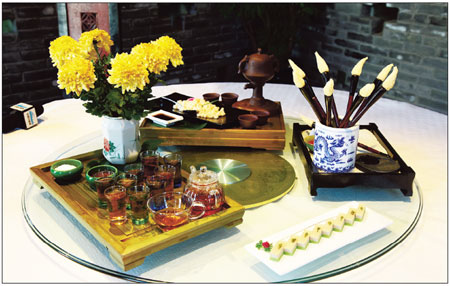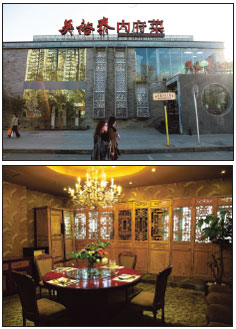Sinking your teeth into a tea banquet
Updated: 2010-12-09 08:01
By Wang Wen(China Daily)
|
|||||||||||
|
A table full of tea-related products, such as edible deep-fried chrysanthemums. [Photo/China Daily] |
According to Chinese tea culture, different kinds of tea have different characteristics that complement different flavors.
For example, Puer Tea with Natural Fried Chrysanthemum, one of the signature dishes at The Refreshments and Cuisine of Wuyutai Court, which offers more than 100 dishes relating to tea.
The dish is simply carefully fried chrysanthemum flowers, which while it may sound easy is actually not that simple - it is a difficult technique to keep the flower perfectly in shape.
"The cook needs to pour hot oil on the flowers very quickly and the flowers also need to be dipped into some egg white," said Tang Haiyan, deputy manager of Wuyutai Court.
Because the hot oil is only poured onto the chrysanthemum flower and the stamen and pistil does not touch any oil, they remain tender and fresh and the fragrance of the chrysanthemum is retained along with the flower's refreshing coolness.
|
Above: The exterior of Wuyutai Court, in Dongzhimen, which is also the former residence of founder Wu Xiqing. Below: The restaurant's dining rooms are extremely traditional in design. |
The same principle applies to Fresh Shrimps with Biluo Tea, although the teapot for Biluo Tea is probably even more special than the dish itself. It is an automatic dark-red enamel pot, which can pour tea automatically as soon as a cup is put on the base of the teapot.
However, the tea at Wuyutai Court is not only for drinking, it's also for eating. To make the appetizer French Goose Liver with Kuding Tea, the cook puts a piece of broadleaf holly leaf, which is known as Kuding Tea in China, on a piece of French goose liver with green tea pudding.
The appetizer combines the bitterness of Kuding Tea with the scent of green tea, as well as the creamy texture of goose liver.
After the main course, the restaurant offers the day's dessert - a Chinese brush. No joke.
The four treasures of the Chinese calligraphy - brush, ink, paper and inkstone - are offered in a pallet, but the essence is the brush. The "brush" is made of wheat flour mixed with cubilose, shark's fin, snow clam and pawpaw.
The wheat flour is arranged artistically into a real brush pot and a Chinese traditional cooking technique named paisu is used to give the material more layers and a crispy texture. The ink in the inkstone is actually blueberry sauce which gives the brush sweet and sour taste. You can choose chili sauce if you prefer.
Although tea is not in all the dishes, the restaurant, which advocates a healthy and natural way of life, only uses green tea seed oil in its kitchen.
Most of the dishes cannot be found outside the court, simply because their techniques were kept secret by Wu Xiqing - who founded Wuyutai more than a century ago.
In fact, Wu's compiled recipes were only discovered from a wall in the Wuyutai Beixinqiao head office, which used to be Wu's house, in late 2006.
Wuyutai Court, which used to be Wu's residence, are located in Dongzhimen. The compound is a three-floor building with three courtyards, which can accommodate 220 guests at one time.
The first floor serves as the reception area and the first floor is the main hall of the restaurant.
There is a platform named Mingxi Park on the first floor where folk artists perform between 7 pm and 9 pm every Monday to Saturday. The average cost in this area is on the high side, about 150 yuan a head.
Ten private dinning rooms are located on the second floor, featuring architectural elements from Anhui province, Wu's hometown. Each room is decorated with gray bricks, Chinese-style antiquated furniture and carved doors. The lotus pool and birdcage on the second floor add vitality.
The third floor is the compound's back yard, where high-level cadres and celebrities used to dine in the past. Now, the third floor remains exclusive as there are only five private dining rooms, which are open to members only, who can enjoy tea banquet menus tailor-made for them. The average cost is around 500 yuan per person.
Wuyutai is one of Beijing's most respected time-honored businesses. It opened its first theme restaurant in Dongzhimen on Aug 8, 2008 to coincide with the opening with the 2008 Beijing Olympic Games.
Their second restaurant was launched on Sept 9, 2009 in the Jinbao Place on Jinbao Street. Although the second restaurant is in a shopping mall, it still follows the three-yard format and is divided into the same three areas with the Dongzhimen compound.

